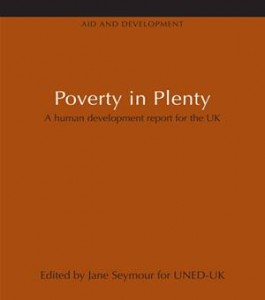'Poverty in Plenty breaks new ground in two ways. It is the first national Human Development Report to focus on an industrialised country and it is the first to be produced by a non-governmental organisation? While problems of poverty and deprivation are less extreme in countries such as the UK than in some other parts of the world, the human development message is still highly relevant. There are many people who suffer through inadequate housing, insufficient means to guarantee a nutritious diet and the absence of secure, rewarding and remunerative employment' From the Foreward by Sakiko Fukuda-Parr, Human Development Report Office, United Nations Development Programme 'The economics that dominates Britain ? loosely known as globilisation ? is a kind of religion which dictates that the worship of money should take preference over common buman values like the sharing of wealth and the right to a decent life. This report reveals the power of traditional economics over our society, and the way in which the lives of our grandmothers and grandfathers, men and women, girls and boys have been damaged and impoverished. I highly recommend it' Ann Pettifor, Director, Jubilee 2000 UK The UK's performance on poverty and deprivation ranks 16th out of 18 industrialised countries ? People living in Glasgow Shettleston are 3.8 times more likely to die before they are 65 years old than those living in Wokingham In industrialised countries, wealth and affluence are widely perceived to be growing, although not at the same rate for everyone. But economic growth is not the same as genuine human development. Poverty in Plenty applies accepted measures of human poverty ? education, health and employment ? to the UK, and assesses how our food and housing policies contribute to a sustainable way of life. It draws on the work of leading research institutes and campaigning groups to determine the real state of society in the UK. Using a range of indicators to measure livelihoods and well-being, the report shows how widespread poverty is and highlights the vast geographical disparities in levels of poverty that exist within the UK. It goes on to set out what urgently needs to be done to address the sobering trends revealed and describes effective policies that will allow us to improve the current situation. The findings are of vital importance to those working on social issues in the public and voluntary sectors, and to students and general readers wanting the truth behind the public statistics. Jane Seymour is an independent researcher and writer on health and environment issues. Originally published in 2000
Poverty in plenty
Sobre
Talvez você seja redirecionado para outro site












